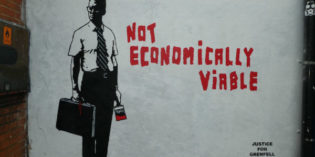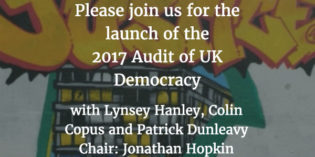The 2017 Audit of UK Democracy

Grenfell’s lessons for democracy: listen to our podcast
On 12 October the author Lynsey Hanley, Conservative London Assembly Member Shaun Bailey, Prof Colin Copus, Prof Patrick Dunleavy and campaigner Clare Coatman launched our 2017 Audit of UK Democracy at the LSE with a discussion of the Grenfell Tower fire. What lessons does the disaster hold for the way local government functions, for regulation […]

Audit 2017: How effectively are class inequalities controlled in the UK?
Class is back – class inequalities now feature centrally in multiple media, are core to campaigns and protest movements, and are a part of everyday conversation. Mitigating their effects again plays a key role in policy formation and formal politics. As part of our 2017 Audit of UK Democracy, James Pattison and Tracey Warren consider how far […]

Audit 2017: How democratic is the Brexit process?
Many political and constitutional steps are needed in order to for the UK to leave the European Union, after 44 years as a full member. Cumulatively they form one of the biggest constitutional changes in British history, and one dogged by intense controversy and disputes. As part of our 2017 Audit of UK Democracy, Joelle Grogan examines […]

Join us at the LSE for the launch of our 2017 Audit of UK Democracy
On Thursday 12 October at 6.30pm Democratic Audit is launching our 2017 Audit of UK Democracy at the LSE with a discussion of the Grenfell disaster’s lessons for local government, public housing and social justice. Speakers include Lynsey Hanley, the author of Estates: An Intimate History, Prof Colin Copus and Prof Patrick Dunleavy, the co-director of Democratic […]

Audit 2017: How effective is the Westminster Parliament in scrutinising central government policy-making?
The House of Commons is one of the oldest and foremost legislatures in the world – yet in the past it was also a byword amongst political scientists for weak legislative control of government. Recently some revisionist authors have painted a more active picture of MPs’ influence. As part of our 2017 Audit of UK […]

Audit 2017: How democratic are the institutions of devolved government in Northern Ireland?
Devolved government in Northern Ireland centres around unique institutions, a power-sharing Executive with ministers chosen on a proportional basis, answering to an Assembly elected using PR. It was designed to overcome the intercommunal strife that has characterised Northern Ireland public life: the challenges it has faced have been particularly acute, and its record has, inevitably, […]

Audit 2017: How democratic and effective is the interest group process in the UK?
Between elections, the interest group process (along with media and social media coverage) is a key way in which citizens can seek to communicate with their MPs and other representatives, and to influence government policy-makers. As part of our 2017 Audit of UK Democracy, Patrick Dunleavy considers how far different social groups can gain access and […]

Audit 2017: How democratic is local government in Wales?
Within Wales, the local councils provide the main focus for democratic politics below the devolved government in Cardiff, and organise the provision of most local services. As part of our 2017 Audit of UK Democracy, James Downe looks at how well they fulfil their roles. A statue in Blaenau Gwent commemorates the Six Bells mining disaster […]

Audit 2017: How well does the UK’s media system sustain democratic politics?
The growth of ‘semi-democracies’ across the world, where elections are held but are rigged by state power-holders, has brought into ever-sharper focus the salience of a country’s media system for the quality of its democracy. Free elections without some form of media diversity and balance clearly cannot hope to deliver effective liberal democracy. As part […]



 Democratic Audit's core funding is provided by the Joseph Rowntree Charitable Trust. Additional funding is provided by the London School of Economics.
Democratic Audit's core funding is provided by the Joseph Rowntree Charitable Trust. Additional funding is provided by the London School of Economics.